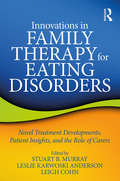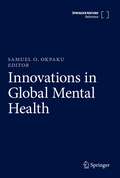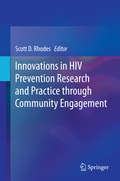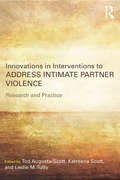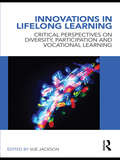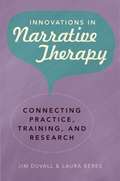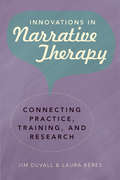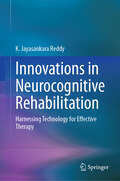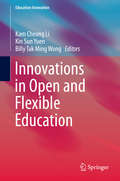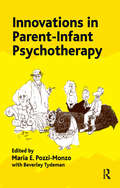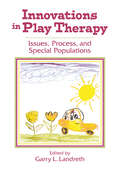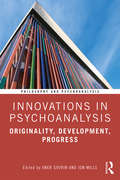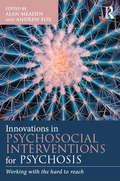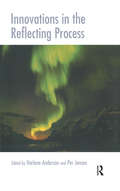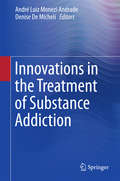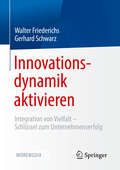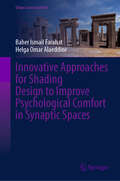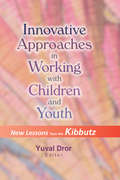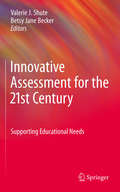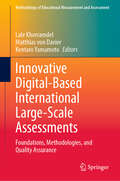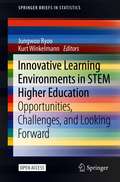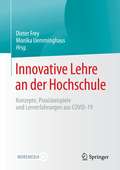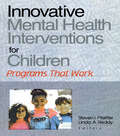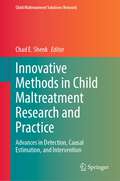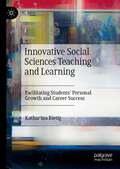- Table View
- List View
Innovations in Family Therapy for Eating Disorders: Novel Treatment Developments, Patient Insights, and the Role of Carers
by Stuart Murray Leigh Cohn Leslie AndersonInnovations in Family Therapy for Eating Disorders brings together the voices of the most-esteemed, international experts to present conceptual advances, preliminary data, and patient perspectives on family-based treatments for eating disorders. This innovative volume is based partly on a special issue of Eating Disorders: The Journal of Treatment and Prevention and includes a section on the needs of carers and couples, "Tales from the Trenches," and qualitative studies of patient, parent, and carer experiences. Cutting edge and practical, this compendium will appeal to clinicians and researchers involved in the treatment of eating disorders.
Innovations in Global Mental Health
by Samuel O. OkpakuOver the course of the last decade, political and mental entities at large have embraced global mental health: the idea that psychiatric health is vital to improved quality of life. Physicians globally have implemented guidelines recommended by the National Institute of Mental Health (NIMH) in 2007, thereby breaking down barriers to care and improving quality of life in areas where these practices have been implemented. Programs for training and education have expanded as a result. Clinicians benefit more from both local resources in some regions as well as in international collaboration and technological advancements. Even amidst all of these positive outcomes, clinicians still face some stumbling blocks. With worldwide statistics estimating that 450 million people struggle with mental, neuropsychiatric, and neurological disorders—25 percent of the world’s non-communicable disease burden—rising to these challenges prove to be no small feat, even in wealthy Western nations. Various articles and books have been published on global mental health, but few of them thoroughly cover the clinical, research, innovative, and social implications as they pertain to psychiatry; often, only one of these aspects is covered. A comprehensive text that can keep pace with the rapidly evolving literature grows more and more valuable each day as clinicians struggle to piece together the changes around the world that leave open the possibility for improved outcomes in care. This book seeks to boldly rectify this situation by identifying innovative models of service delivery, training, education, research funding, and payment systems that have proven to be exemplary in implementation and scalability or have potential for scalability. Chapters describe specific barriers and challenges, illuminating effective strategies for improved outcomes. This text is the first peer-reviewed resource to gather prestigious physicians in global mental health from around the world and disseminate their expertise in the medical community at large in a format that is updateable, making it a truly cutting-edge resource in a world constantly changed by medical, scientific, and technological advances. Innovations in Global Mental Health is the ultimate resource for psychiatrists, psychologists, primary care physicians, hospitalists, policy makers, and all medical professionals at the forefront of global mental health and its implications for the future.
Innovations in HIV Prevention Research and Practice through Community Engagement
by Scott D. RhodesHIV continues to be a profound challenge facing communities nationally and internationally. Until a vaccine or a cure is found, prevention remains a most crucial line of defense. However, the successes made to reduce exposure and transmission have not benefited all communities equally. HIV continues to affect vulnerable communities, and HIV-related health disparities are growing. The work documented in Innovations in HIV Prevention Research and Practice through Community Engagement spotlights the effectiveness of community involvement to reduce HIV infections in the United States. This timely resource introduces the concepts of community engagement, partnership, and community-based participatory research (CBPR). Contributors provide detailed examples of these concepts in which diverse research partners blend their unique insights and skills to arrive at an authentic understanding of phenomena and inform the translation of best practices and processes to enhance equity in HIV prevention and treatment. Equitable interactive collaboration is central to these efforts, in which community members and representatives from organizations, the scientific and medical sectors, and other relevant agencies nurture long-term health improvement through sustained teamwork. Challenges and barriers to effective engagement are identified, as are characteristics of successful partnerships. Included in the book: Details of a multigenerational HIV prevention intervention in a rural southeastern community. The challenges and successes of developing, implementing, and evaluating an intervention for higher-risk predominately heterosexual black men in college. The history of gay community involvement in HIV prevention and its contributions to the theory and current practice of engagement. Next steps in the integration of HIV-related policy change and research. Community engagement within American Indian communities. Keys to sustaining a CBPR partnership to prevent HIV within ethnic, sexual, and gender minority communities. Innovations in HIV Prevention Research and Practice through Community Engagement offers researchers and practitioners in public health, community health, and medicine guidance on community engagement that is both inspiring and realistic. "Community engagement and knowledge continue to be essential to prevent HIV infections. This book is a compilation of the state-of-the-science of engagement and delves deeper into the meaning and utilization of community-based participatory research, with implications that reach beyond the HIV epidemic to public health and medicine in general. " - Laura C. Leviton, PhD, Senior Advisor for Evaluation, Robert Wood Johnson Foundation, Princeton, NJ
Innovations in Interventions to Address Intimate Partner Violence: Research and Practice
by Tod Augusta-Scott Katreena Scott Leslie M. TuttyInnovations in Interventions to Address Intimate Partner Violence: Research and Practice speaks to what can be done to effectively intervene to end intimate partner violence against women. Including contributions from both researchers and practitioners, chapters describe service innovations across systems in large urban and remote rural contexts, aimed at majority and minority populations, and that utilize a range of theoretical perspectives to understand and promote change in violence and victimization. Reflecting this range, contributions to this volume are organized into five sections: legal responses to domestic violence, intervention with men who have perpetrated domestic violence, responses to women who have experienced domestic violence, restorative approaches to intimate partner violence, and a section on integrating intervention for domestic violence across systems. The book highlights advances in practice which will be of interest to researchers, practitioners, policy makers and students.
Innovations in Lifelong Learning: Critical Perspectives on Diversity, Participation and Vocational Learning
by Sue JacksonThis book opens up ways to engage critically with what counts as innovatory practice in lifelong learning today, locating its discussion of innovations in lifelong learning within an international and comparative framework. Innovations in Lifelong Learning engages first hand with issues and concerns from around the globe, offering an international perspective on current trends through its range of contributions from across the UK, Australia, New Zealand and the US. The broad focus allows for diverse information on the nature of these changes to come together under an assortment of empirical, theoretical and methodological approaches. The book takes three key elements of lifelong learning: learning communities participation and non-participation work-based learning and learning through work. It links these with themes on diversity, social justice and economic and global development so as to negotiate and re-negotiate the constant importance of innovation with employers, learners and educational institutions. All those working in the broad arena of lifelong learning will benefit from this comprehensive examination of current debates in the field, including policy-makers, researchers, teachers, lecturers, educational managers and employers engaged with work-based learning.
Innovations in Narrative Therapy: Connecting Practice, Training, and Research
by Jim Duvall Laura BéresNarrative therapy introduces the idea that our lives are made up of multiple events that can be strung together in many possible stories. These stories can be developed to find richer (or "thicker") narratives, and thus release the hold of negative ("thin") narratives upon the client. Replete with case examples from clinical practice, this is the first book to present a compelling evidence base for narrative therapy, interweaving practice tips, training, and research. The book's rigorous, research-based approach meets the increasing demand on therapists to demonstrate the effectiveness of their approach, critically reflecting on both process and outcomes, expanding on the concept of evidence-based practice.
Innovations in Narrative Therapy: Connecting Practice, Training, and Research
by Jim Duvall Laura BéresPresenting a compelling evidence base for narrative therapy. Narrative therapy introduces the idea that our lives are made up of multiple events that can be strung together in many possible stories. These stories can be developed to find richer (or "thicker") narratives, and thus release the hold of negative ("thin") narratives upon the client. Replete with case examples from clinical practice, this is the first book to present a compelling evidence base for narrative therapy, interweaving practice tips, training, and research. The book's rigorous, research-based approach meets the increasing demand on therapists to demonstrate the effectiveness of their approach, critically reflecting on both process and outcomes, expanding on the concept of evidence-based practice.
Innovations in Neurocognitive Rehabilitation: Harnessing Technology for Effective Therapy
by K. Jayasankara ReddyNeurocognitive disorders, such as Alzheimer's disease, stroke, and traumatic brain injuries, have a significant global impact, causing significant challenges for healthcare systems and families. Traditional rehabilitation methods often do not effectively target the diverse and complex cognitive impairments associated with these illnesses. Technology facilitates personalized rehabilitation approaches, enhances patient engagement, and enables unbiased evaluations of progress. This book is particularly pertinent in an era of rapid technological advancement, as it presents exceptional opportunities to revolutionize neurorehabilitation techniques and improve patient outcomes.
Innovations in Open and Flexible Education (Education Innovation Series)
by Kam Cheong Li Kin Sun Yuen Billy Tak WongThis book covers a broad range of innovations in education, such as flipped classrooms, the educational use of social media, mobile learning, educational resources and massive open online courses, as well as theoretical discussions and practical applications in the use of augmented reality and educational technology to improve student engagement and pave the way for students’ future studies and careers. The case studies and practical applications presented here illustrate the effectiveness of new modes of education in which the latest technologies and innovations are widely used in the global context. Accordingly, the book can help develop readers’ awareness of the potential these innovations hold, thus expanding their expertise and stimulating critical thinking as to how new technologies have made learning and teaching easier in various educational settings.
Innovations in Parent-Infant Psychotherapy: International Contributions
by Maria E. Pozzi-Monzo Beverley TydemanThis book has emerged from the authors' excitement about the proliferation of parent-infant psychotherapy work around the world, including Australia, Brazil, Europe, South Africa and the United States. It shows how the therapy connects with the culture of the family inspired by the wider community.
Innovations in Play Therapy
by Garry L. LandrethThis book is unique in exploring the process of conducting short-term intensive group play therapy and the subsequent results. It focuses on play therapy with special populations of aggressive acting-out children, autistic children, chronically ill children, traumatized children, selective mute children, disassociative identity disorder adults with child alters, and the elderly. The book addresses such vital issues as: * How play therapy helps children * Confidentiality in working with children * How to work with parents * What the play therapist needs to know about medications for children The difficult dimension of diagnosis is clarified through specific descriptions of how the play therapist can use play behaviors to diagnose physical abuse, sexual abuse, and emotional maladjustment in children.
Innovations in Psychoanalysis: Originality, Development, Progress (Philosophy and Psychoanalysis)
by Jon Mills Aner GovrinFrom its very inception, psychoanalysis has been a discipline encompassing two contradictory tendencies. This dualistic tendency – tradition alongside disenchantment and the will to improve knowledge – is likely responsible for psychoanalysis’s powerful capacity to survive. In Innovations in Psychoanalysis: Originality, Development, Progress, Aner Govrin and Jon Mills bring together the most eminent and diverse psychoanalysts to reflect upon the evolution, vitality, and richness of psychoanalysis today. Psychoanalysis is undergoing significant transformations involving the entire spectrum of disciplinary differences. This book illuminates these transformations, importantly revealing the innovations in technique, the evolving understanding of theory within existing schools of thought, the need for empirical resurgence, innovations in infant research, neuropsychoanalysis, in the development of new interventions and methods of treatment, and in philosophical and metatheoretical paradigms. Uniquely bringing together psychoanalysts representing different fields of expertise, the contributors answer two questions in this collection of ground-breaking essays: "What are the most important developments in psychoanalysis today?" and "What impact has your chosen perspective had on conducting psychoanalytic treatment?" Their thought-provoking and challenging answers are essential for anyone who wants to fully understand the field of psychoanalysis in our changing, current world. Innovations in Psychoanalysis brings a whole array of differing schools of thought in dialogue with one another and will be of interest to psychoanalysts, psychologists, psychotherapists, philosophers, and historians of the behavioral sciences worldwide.
Innovations in Psychosocial Interventions for Psychosis: Working with the hard to reach
by Andrew Fox Alan MeadenDespite the steady acceptance of psychological interventions for people with psychosis in routine practice many people continue to experience problems in their recovery. The need to develop new approaches, particularly for those who are more difficult to engage and have significant co-morbidities is therefore important. Innovations in Psychosocial Interventions for Psychosis positions psychological formulation as a key organising principle for the delivery of care within multidisciplinary teams. The interventions described all have the common theme of supporting recovery and achieving goals that are of primary importance to the service user which targets interventions on broader obstacles to recovery. Along with their experienced contributors, Alan Meaden and Andrew Fox introduce new developments in psychological interventions for people affected by psychosis who are hard to reach, working in a variety of settings with people at various stages of recovery. The book is divided into three parts. In part one brief interventions and approaches aimed at promoting engagement are described as interventions in their own right. Part two is focused on longer-term interventions with individuals. Some of these highlight new developments in the evidence base whilst others draw on work applied less frequently to psychosis drawing from the broader psychological therapy practice-based evidence field. In part three attention is given to innovations in group settings and those aimed at promoting greater multidisciplinary working in settings where a whole team approach is needed. Each chapter describes the theory underpinning a different approach, its development, key strategies, principles and stages, and contain case examples that illustrate the use of the approach in a clinical setting. Innovations in Psychosocial Interventions for Psychosis will be an invaluable resource to professionals working with this client group, including clinical and counselling psychologists, psychiatrists, and other allied health professionals.
Innovations in the Reflecting Process: Innovations In The Reflecting Process - The Inspirations Of Tom Andersen (The Systemic Thinking and Practice Series)
by Per Jensen David Campbell Harlene Anderson Ros Draper'The passion to continually be on the move to seek new understanding is a characteristic of the field of family therapy and systemic thinking over the last forty years. Many professionals have moved around, more or less freely, in and out of this field. Some have made footprints that will last for a long time. One of these is Tom Andersen. From a position as professor in social psychiatry at the University of Tromso in northern Norway he has moved around the world participating with other professionals in their efforts to develop their work and seek wider horizons.' - Harlene Anderson and Per Jensen, from the Preface
Innovations in the Treatment of Substance Addiction
by Denise Micheli André Luiz Monezi AndradeEmerging approaches to treating addictions and minimizing relapse are spotlighted in this idea-packed volume, as alternatives or adjuncts to standard psychological and pharmacological therapies. Its biopsychosocial perspective delves into the causes and processes of chemical dependence, and the clinical characteristics it shares with other addictions (e. g. , food, sex, gambling, online activities), to identify client needs that substance abuse may fulfill. Accordingly, the diverse modalities featured here address substance addiction on multiple levels, offering clients physical or mental stimulation and/or emotional relief as well as affording different degrees of autonomy. Methods can be mixed and matched to reinforce treatment goals, and clinicians can tailor treatment to individual issues and interests to assure clients nuanced and meaningful care. Included in the coverage: #65533; Use of herbal medicine to treat drug addiction. #65533; EMDR therapy and the treatment of substance abuse and addiction. #65533; Evaluating the change processes in drug users' interventions. #65533; Web-based interventions for substance abuse. #65533; Physical exercise and treatment of addiction. #65533; Mindfulness to reduce the anxiety during the abstinence #65533; Neurofeedback to deal with craving and anxiety symptoms Psychologists, psychiatrists, clinical social workers, and addiction counselors and educators will find Innovations in the Treatment of Substance Addiction a valuable sourcebook for understanding addiction--and intervention--in its wider context.
Innovationsdynamik aktivieren: Integration von Vielfalt - Schlüssel zum Unternehmenserfolg
by Gerhard Schwarz Walter FriederichsIn diesem Buch wird beschrieben wie Innovationsdynamik aktiviert wird. Am Beispiel des traditionellen Executive Onboarding wird gezeigt, dass der Fokus auf Anpassung des neuen Organisationsmitglieds an die bestehenden Regeln Innovationspotential vernichtet. Das steht im Widerspruch zu der Notwendigkeit, sich im Zuge der zunehmenden Komplexität auf unvorhergesehene Veränderungen in kürzester Zeit einzustellen. Durch die Integration neuer Perspektiven können Unternehmen eine Dynamik entwickeln, die den schnellen Veränderungen gewachsen ist. Dafür müssen Teams in heterogener Zusammensetzung funktionsfähig werden und neue Perspektiven so integrieren, dass sie Teil ihrer Teamidentität werden. Das leisten wir durch Überwinden emotionaler und sozialer Barrieren gegen Neues.
Innovative Approaches for Shading Design to Improve Psychological Comfort in Synaptic Spaces (Urban Sustainability)
by Baher Ismail Farahat Helga Omar AlaeddineThis book explores how innovative shading design improves psychological comfort in synaptic spaces – those dynamic and transitional built environments where people connect, engage, and interact. Bridging architecture, environmental psychology, and neuroarchitecture, it proposes efficient cutting-edge strategies to create responsive and flexible environments. It examines shading as a powerful design tool that transcends function to shape psychological experience, sensory balance and spatial identity. Through interdisciplinary research and case-based analysis, the book offers valuable practical guidance for architects, urban designers, and researchers seeking to create human-centered environments that foster well-being and enhance the quality of lived spaces through thoughtful design.
Innovative Approaches in Working with Children and Youth: New Lessons from the Kibbutz
by Yuval DrorExplore the unique social and educational laboratory known as the Israeli kibbutz!This valuable book examines state-of-the-art innovations in services for children and youth happening today in the kibbutz in Israel. It brings to light the latest developments in integrated services for clients inside and outside the kibbutz society, services for detached and troubled individuals and groups from outside the kibbutz, and regional services that include kibbutz and non-kibbutz children who live at home while attending kibbutz institutions.According to editor Yuval Dror, ”Since the mid-1980s, the kibbutz movement has experienced a deep social and economic crisis, but despite this negative influence on the semi-private kibbutz educational system, the uniqueness of &’communal/cooperative education&’ has been maintained, and has even grown. The openness of the kibbutz to its neighbors from non-kibbutz settlements in the 1980s and 1990s enabled rural areas to succeed in fruitful cooperation with the kibbutz. These experiences are detailed here.”In Innovative Approaches In Working with Children and Youth: New Lessons from the Kibbutz you&’ll learn about youth aliya groups (youth societies), the Project for the Education of Israeli Children in the Kibbutz Movement, the NA&’ALEH Program, and the Zweig Center for Special Education at Oranim. This unique book brings you: a comparison of two kibbutz secondary boarding schools with residential facilities in different forms a look at a unique way of absorbing young Russian immigrants in kibbutzim and other residential settings an examination of integration practice in kibbutz day schools a discussion of how Kfar Tikva serves disabled adults . . . and much more!Educators and their students, youth workers, and social workers, as well as anyone with an interest in the unique learning opportunities offered by the kibbutz system will find Innovative Approaches In Working with Children and Youth: New Lessons from the Kibbutz an invaluable tool.
Innovative Assessment for the 21st Century
by Betsy Jane Becker Valerie J. ShuteIn today's rapidly changing and information-rich world, students are not acquiring adequate knowledge and skills to prepare them for careers in mathematics, science, and technology with the traditional approach to assessment and instruction. New competencies (e.g., information communication and technology skills) are needed to deal successfully with the deluge of data. In order to accomplish this, new "educationally valuable" skills must be acknowledged and assessed. Toward this end, the skills we value and support for a society producing knowledge workers, not simply service workers, must be identified, together with methods for their measurement. Innovative Assessment for the 21st Century explores the faces of future assessment--and ask hard questions, such as: What would an assessment that captures all of the above attributes look like? Should it be standardized? What is the role of the professional teacher?
Innovative Digital-Based International Large-Scale Assessments: Foundations, Methodologies, and Quality Assurance (Methodology of Educational Measurement and Assessment)
by Matthias Von Davier Kentaro Yamamoto Lale KhorramdelThis edited volume provides a comprehensive overview of the technology-driven innovations that have transformed National and International Large-Scale Assessments over the past decade, along with the research and considerations that have accompanied these changes. It documents the groundwork for ongoing innovations and explores future directions as these assessments continue to evolve. While the impact of technology on education and assessments is difficult to predict, best practices and emerging principles for transitioning from paper-based to digital formats can be described. The volume offers guidelines and examples from experts who have transitioned assessments like PISA, PIAAC, TIMSS, PIRLS, and NAEP into the digital era. It also highlights research on digital-based assessments, showcasing new insights from log file and process data, as well as innovative domains.
Innovative Learning Environments in STEM Higher Education: Opportunities, Challenges, and Looking Forward (SpringerBriefs in Statistics)
by Kurt Winkelmann Jungwoo RyooAs explored in this open access book, higher education in STEM fields is influenced by many factors, including education research, government and school policies, financial considerations, technology limitations, and acceptance of innovations by faculty and students. In 2018, Drs. Ryoo and Winkelmann explored the opportunities, challenges, and future research initiatives of innovative learning environments (ILEs) in higher education STEM disciplines in their pioneering project: eXploring the Future of Innovative Learning Environments (X-FILEs). Workshop participants evaluated four main ILE categories: personalized and adaptive learning, multimodal learning formats, cross/extended reality (XR), and artificial intelligence (AI) and machine learning (ML). This open access book gathers the perspectives expressed during the X-FILEs workshop and its follow-up activities. It is designed to help inform education policy makers, researchers, developers, and practitioners about the adoption and implementation of ILEs in higher education.
Innovative Lehre an der Hochschule: Konzepte, Praxisbeispiele und Lernerfahrungen aus COVID-19
by Dieter Frey Monika UemminghausDieses Buch vermittelt anschaulich und konkret, wie an der Exzellenzuniversität LMU München im Rahmen des Multiplikatoren-Programms entwickelte innovative Lehrkonzepte von Dozent*innen aller Fachgebiete in der eigenen Lehrtätigkeit umgesetzt werden können. Neben grundlegenden Hinweisen zu lernpsychologisch fundierten Maßnahmen für Führung von Teams, Motivation von Studierenden sowie Wertevermittlung und Begeisterung werden neue Ansätze digitaler Lehre vermittelt. Ergänzend fließen ganz aktuelle Erkenntnisse aus den ersten durch COVID-19 bedingten, rein digitalen Semestern ein und bieten die Chance, aus diesen Erfahrungen für die Lehrformate der Zukunft zu lernen. In einem zweiten Buchteil berichten Lehrende aus unterschiedlichen Fachgebieten von konkreten Innovationsmaßnahmen zur Verbesserung der Lehrqualität und stellen ihre spezifischen Ansätze zur Lösung von universitärer Lehre immanenten Problemlagen vor. Diese kurzen Best-Practice-Berichte, die in ausführlicherer Form im Internet als downloadbare Online-Ressource bereitgestellt werden, geben Anregungen, wie diese Projekte für andere Lehrende diverser Fachgebiete adaptierbar sind.
Innovative Mental Health Interventions for Children: Programs That Work
by Steven I Pfeiffer Linda A ReddyChildren and families are in increasing need of mental health services that are more effective and less costly. Are you prepared to make this happen?This vital book for clinical psychiatrists and trainers examines uniquely successful prevention programs addressing the most challenging mental health problems in children. In it, leading authorities in child and family mental health provide compelling descriptions of these model prevention programs, which are clinically proven and cost-effective.Each chapter describes an internationally recognized program, including program mission and goals, key treatment ingredients, logistical and operational considerations, evaluation data, and replicability/transportability considerations. With Programs That Work: Innovative Mental Health Interventions for Children, you will explore insightful, expert examinations of: an interpersonal cognitive problem-solving program that can reduce and help prevent high-risk behaviors in young children a video-based program aimed at reducing substance abuse and behavioral problems in young adolescents the Teaching-Family Model (TFM) which stresses the importance of a positive family environment for children and adolescents with emotional/behavioral problems in residential treatment centers a set of school-based intervention programs for parents, teachers, and children ages 3--10 which can help reduce or prevent conduct problems and drug abuse in children MST (multisystemic therapy) programs aimed at juvenile offenders and youths who abuse substances--people who are not typically compliant with treatment programs the Anger Coping Program which can improve the social/cognitive skills of aggressive children aggression replacement training which combines skill streaming, anger control, and moral education to prevent aggression in adolescents multidimensional treatment foster care for adjudicated youthThe programs and interventions you will find in Programs That Work: Innovative Mental Health Interventions for Children address a great variety of serious emotional problems in children and adolescents, and emphasize the importance of an ecological and multi-systems approach to treatment. Explore them and choose what will work best for the children and families in your community!
Innovative Methods in Child Maltreatment Research and Practice: Advances in Detection, Causal Estimation, and Intervention (Child Maltreatment Solutions Network)
by Chad E. ShenkThis book examines the latest methodological advancements in child maltreatment research and practice. It addresses long-standing challenges when working with and serving the child maltreatment population, while offering pragmatic solutions for scientists, caseworkers, and providers. Chapters explore methodological innovations in such areas as screening and detecting child maltreatment, collecting objective data in longitudinal research, causal modeling of adverse health effects, and advancements in both preventive and clinical interventions.Key areas of coverage include methods for: Screening for child maltreatment at the point of contact.Reducing bias and promoting causal inference when examining health effects and etiological processes.Promoting representative samples, objective data collection, and integration of child welfare and medical records to enhance equitable access to care.Intervening with children and families at risk for and exposed to maltreatment. Innovative Methods in Child Maltreatment Research and Practice is a must-have reference for researchers, professors, and graduate students as well as clinicians, therapists, and other professionals in developmental, clinical child, and school psychology.
Innovative Social Sciences Teaching and Learning: Facilitating Students' Personal Growth and Career Success
by Katharina RietigThis book offers novel insights into how students can develop a personal growth mindset during their degree programs that allows them to view new challenges as opportunity to grow personally, reflect on the new knowledge and experience, and subsequently improve their skills to critically examine and evaluate information in a journey of personal growth. Based on learning theories drawn from cognitive and social psychology and over 12 years of integrating the ‘personal growth mindset’ into course design, it offers a novel framework that allows higher education teachers to constructively align learning objectives and assessments with crucial transferable skill development, and fostering a mindset for personal growth among students that focuses on continuously improving and reflecting on feedback. The objective is to empower academics to build courses and degree programs that are ‘fit for purpose’ by equipping social science students with the skills and mindsets that will benefit them throughout their careers in ever changing and newly emerging jobs. The book will appeal to those who are interested in how individuals learn in educational settings and in the wider workplace.
